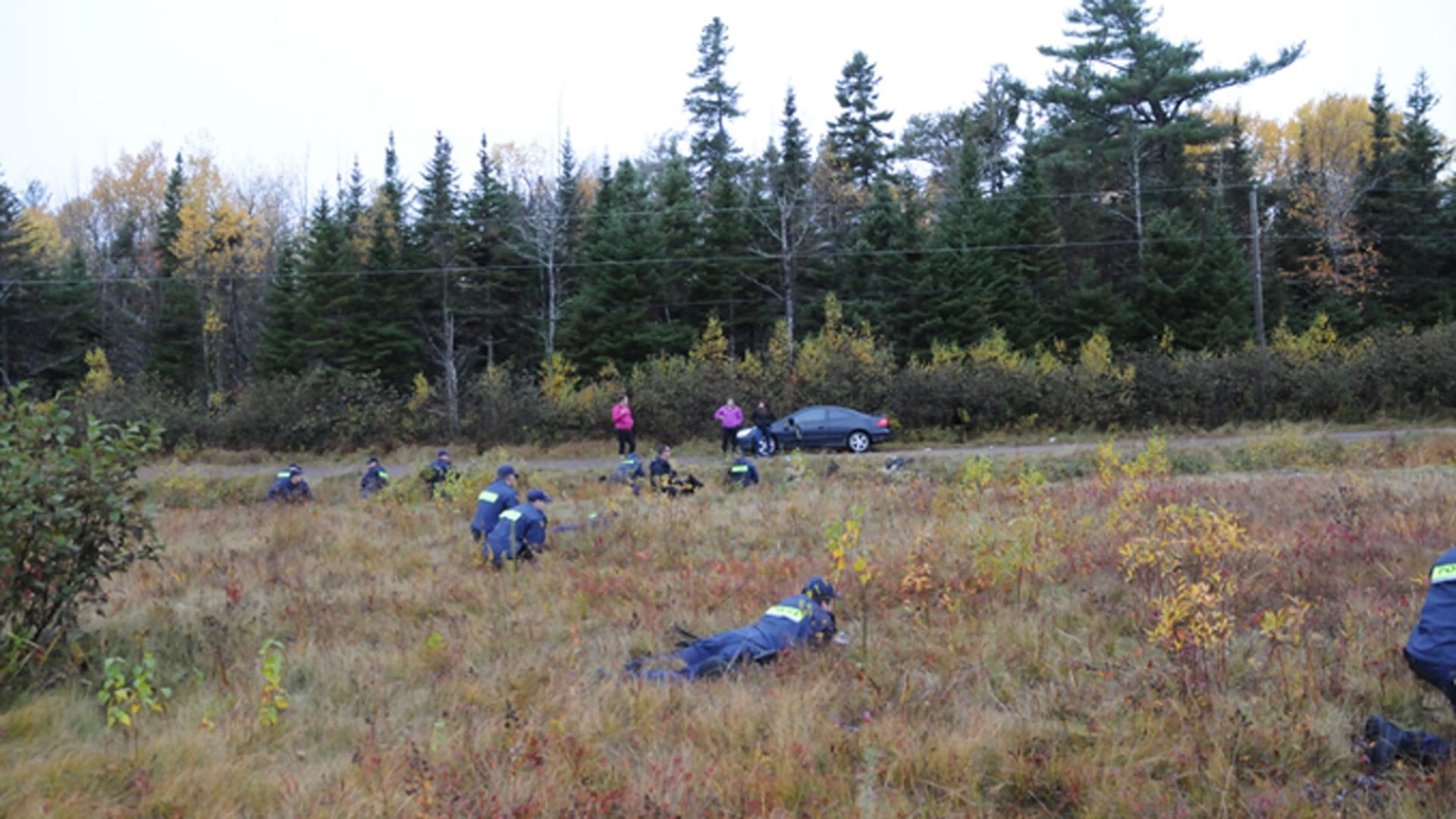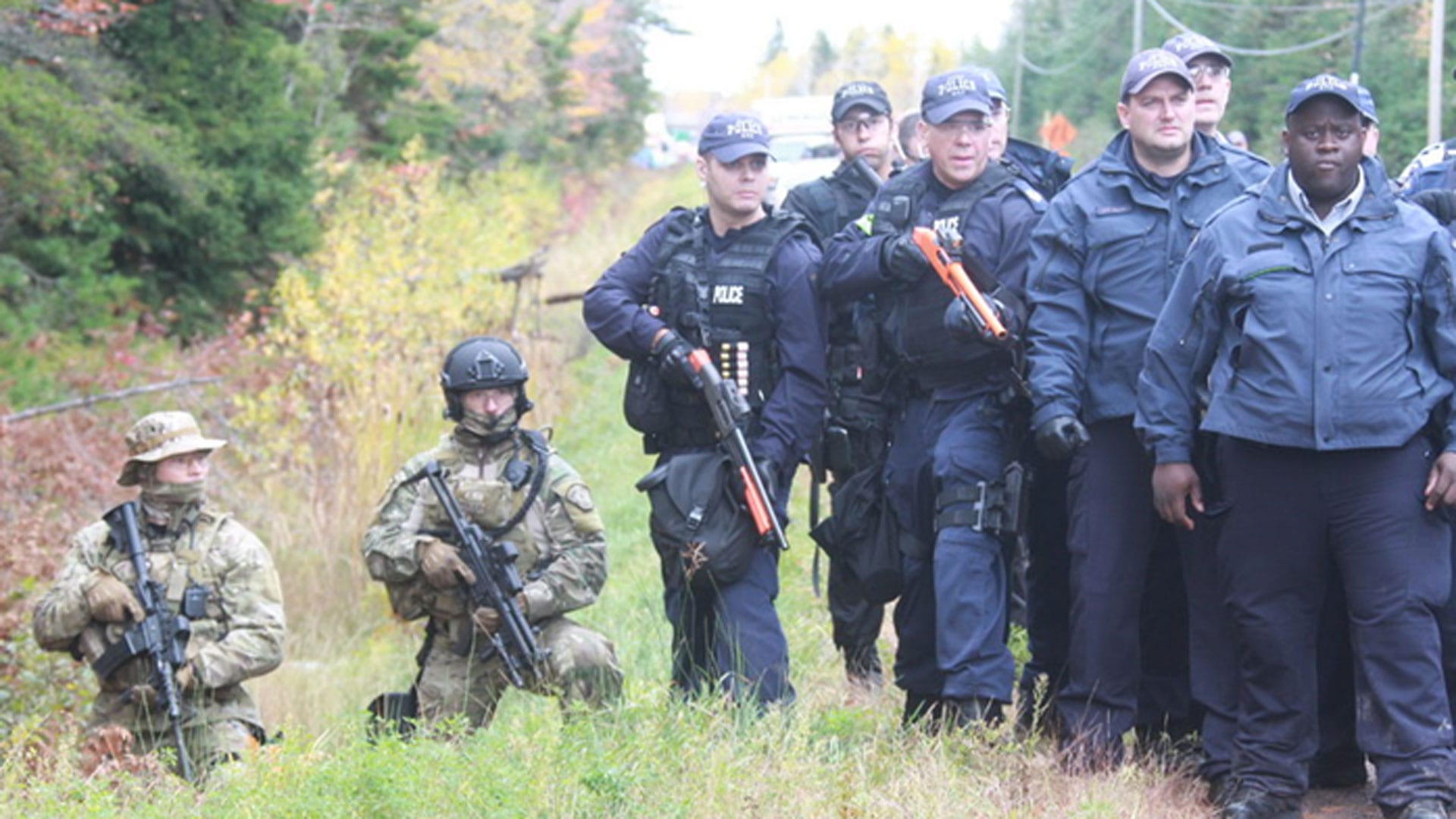
This was the scene on Oct. 17, 2013 when RCMP descended on the Mi'kmaw led anti-fracking blockade near Elsipogtog. Photo: Ossie Michelin/APTN
The RCMP’s use of force during a militarized crackdown on Mi’kmaw-led anti-fracking protests in New Brunswick was “generally necessary” and reasonable under the tense circumstances of the 2013 standoff, the RCMP watchdog agency says.
But the Civilian Review and Complaints Commission (CRCC) also says some elements of the police response were unconstitutional or illegal.
“In relation to police roadblocks and stop checks and the collection of open-source intelligence, the Commission has expressed concerns about the reasonableness and, at times, the legality of the practices engaged in by the RCMP,” it said.
On Thursday, the Commission released 38 findings along with 12 recommendations in its final report on the policing of Mi’kmaw protests against hydraulic fracturing shale gas exploration on unceded territory near Elsipogtog and Rexton, N.B.

Mi’kmaw resistance to local exploration by Texas-based SWN Resources began in June 2013, escalated through the summer and eventually led to a blockade and land occupation that halted work.
The standoff culminated in an Oct. 17 police raid in which camouflage-clad Mounties with assault rifles, riot control shotguns and canine units descended on the camp and arrested over 40 people. The Commission received several complaints and the chairperson initiated an investigation in 2014.
The Commission concluded that police didn’t demonstrate bias against Indigenous people generally, didn’t act as a private security for the gas company and were justified in pushing, striking, pepper spraying or pointing weapons at those who were “effectively participating in a riot” and burned police cars in response.
“However, the Commission did find instances when the plastic tie wrap handcuffs placed on some protesters were likely tighter than necessary.”
Read More:
Military’s counter-intelligence unit monitored Elsipogtog anti-fracking protests: documents
Hundreds of complaints filed against RCMP after Elsipogtog fracking blockade
The report also raised concerns about the legality of police search and surveillance practices.
“The Commission found that some of the RCMP’s surveillance practices and physical searches were inconsistent with protesters’ Charter rights to be free from unreasonable search and seizure,” said the report.
This included conducting random “stop checks” on vehicles and searching people without having any clear legal authorization, such as a search warrant, to do so.
The Commission recommended “that, particularly when policing a public protest, members be cognizant of the limits of their powers, specifically in relation to curtailing protesters’ ability to assemble and express themselves in a lawful manner.”
Under federal legislation, the CRCC has to issue an interim report to the RCMP and then await the RCMP commissioner’s response before the findings become public.
In this case, Brenda Lucki accepted most of the findings, even certain critical ones, but rejected others and believed three of 12 recommendations required no further action.

This raised “serious concerns” at the CRCC as the Mounties pushed back mainly on findings that dealt with restrictions or violations of civil liberties, including recommendations concerning roadblocks, social media intelligence gathering, exclusion zones and limits to police powers.
“The RCMP strongly rejected recommendations limiting collection and retention of open-source information. The Commission has serious concerns about the RCMP’s approach in such matters,” said the report. “The Commission notes that the RCMP’s response further heightened many of those concerns.”
The CRCC, in an unusual move, already released some of these criticisms earlier this year after the B.C. Civil Liberties Association and others flagged the Mounties’ use of these tactics during the Coastal GasLink pipeline standoff on unceded Wet’suwet’en territory.
Chairperson Michelaine Lahaie explained that the CRCC wouldn’t investigate these matters because its review of the New Brunswick events already covered them.
The report also found that, while police seemed generally aware of the need to respect the sanctity of certain ceremonies and items, some members didn’t.
“I recommend that the RCMP require all members to review its Native Spirituality Guide, and that all members involved in Indigenous policing, including those who may police protests, receive training on Indigenous cultural issues,” said Lahaie in a prefatory statement.
“I trust that my report, and the 21 individual complaints reviewed, will assist the RCMP in performing its important public order duties while also respecting the rights of all and, in particular, the Indigenous community’s unique place in Canada.”









